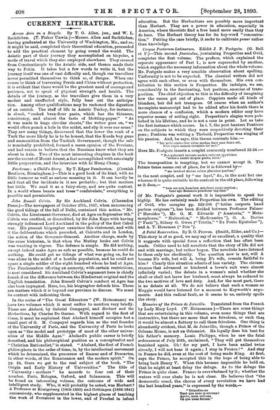A Fatal Reservation. By R. 0. Prowse. (Smith, Elder, and
Co.)— This story is of so good, we may say of so excellent, a quality that it suggests with special force a reflection that has often been made. Critics used to tell novelists that the story of life did not end with marriage, but rather began. The novelists have listened to them only too obediently. The question now is not, will A become B's wife, but will A, being B's wife, remain faithful to him P Clearly this situation admits of less variety. The circum- stances that advanced or hindered a lover's suit were almost infinitely varied; the debate in a woman's mind whether she shall or shall not leave her husband, must always be reduced to the two motives of love and duty. And, for the most part, there is no debate at all. We do not believe that such a woman as Maggie would have listened for a moment to Keyworth's argu- ments. And this radical fault, as it seems to us, entirely spoils the story.






































 Previous page
Previous page